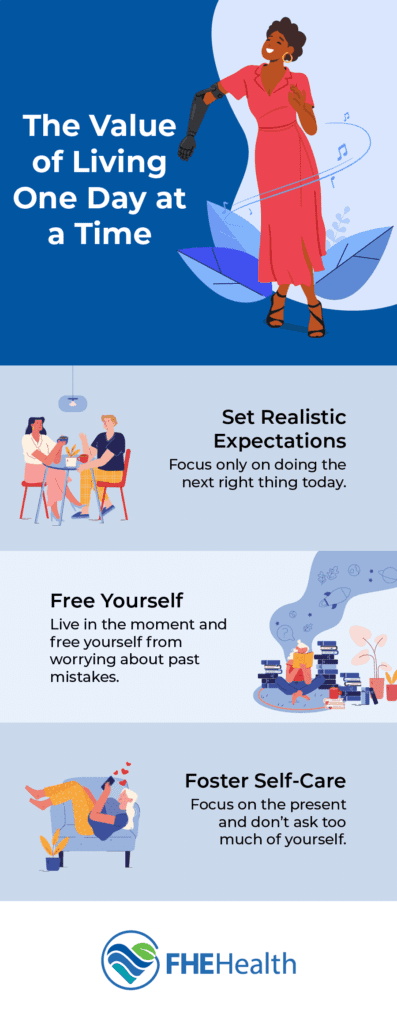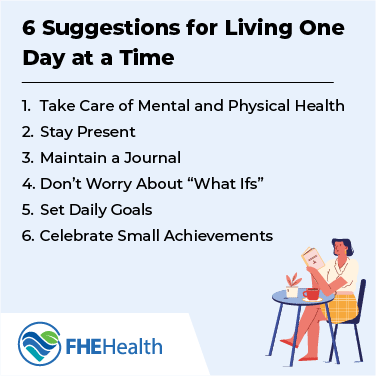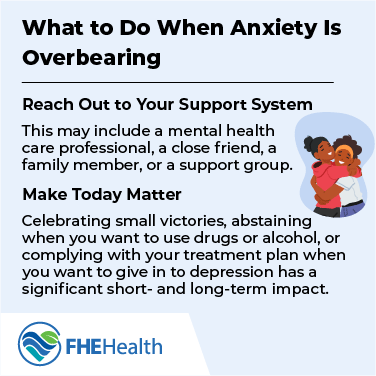
Throughout the course of treatment for an addiction or mental health disorder, the phrase “live one day at a time” often comes up. This phrase isn’t just a cliché; it’s a reminder that while we can’t always predict and control the future, there are things we can do today to support sobriety and mental wellness.
Living one day at a time simply means focusing on the present. This phrase, which is commonly used in settings such as Alcoholics Anonymous meetings, originates from the AA guidebook Living Sober. In this book, authors Dr. Bob Smith and Bill Wilson state:
Although we realize that alcoholism is a permanent, irreversible condition, our experience has taught us to make no long-term promises about staying sober. We have found it more realistic—and more successful—to say, “I am not taking a drink just for today.” Even if we drank yesterday, we could plan not to drink today. We may drink tomorrow—who knows whether we’ll even be alive then?—but for these 24 hours, we decide not to drink. No matter what the temptation or provocation, we determine to go to any extremes necessary to avoid a drink today.
Especially in the early days of treatment for an addiction or mental illness, it can be daunting to think about the effort lasting change requires. Rather than worrying about whether you’ll be sober in six months or if you’ll be able to consistently follow your treatment plan for the rest of your life, you concentrate on what you can do today.
What Is the Value of Living One Day at a Time?
 The idea of dutifully taking necessary medications, attending support groups, and abstaining from drugs or alcohol for the rest of your life may be overwhelming to think about. This is where living one day at a time comes in: It shifts the focus off the unpredictable future and centers it on the here and now. Incorporating this philosophy sets individuals up for success by empowering them to take charge of what they can control today.
The idea of dutifully taking necessary medications, attending support groups, and abstaining from drugs or alcohol for the rest of your life may be overwhelming to think about. This is where living one day at a time comes in: It shifts the focus off the unpredictable future and centers it on the here and now. Incorporating this philosophy sets individuals up for success by empowering them to take charge of what they can control today.
It Sets a Realistic Expectation
Living one day at a time acknowledges that doing what’s necessary for mental health and sober living is a big undertaking. For someone whose lived with a mental illness and/or addiction for years, focusing on doing the next right thing today, rather than wondering how they’re going to manage long-term, may feel more realistic and attainable.
It’s Freeing
During and after rehab, many people experience regrets about missed opportunities and broken relationships. Dwelling on the past is not only discouraging, but it can also hinder progress. Living in the moment frees the individual from worrying about past mistakes or stressful circumstances and instead focusing on how to get the most from today.
It Fosters Self-Care
Taking life one day at a time means the individual isn’t asking too much of themselves or neglecting their needs. They can focus their attention on the present and put into practice the skills and strategies they learned while in treatment.
Who Benefits from the One Day at a Time Philosophy?
While anyone can benefit from the philosophy of living one day at a time, it may be especially beneficial for those recovering from addiction or mental illness. Oftentimes, those in recovery have regrets about the past and may be unable to feel optimistic about the future. Living one day at a time lets them let go of past mistakes and disappointments while freeing them from worrying about the future.
6 Suggestions for Living One Day at a Time
 Staying anchored in the present is essential for mental health and sober living. There are numerous strategies that may be helpful for learning how to take in one day at a time. Here are six….
Staying anchored in the present is essential for mental health and sober living. There are numerous strategies that may be helpful for learning how to take in one day at a time. Here are six….
1. Take Care of Mental and Physical Health
Nourishing your mind and body every day is essential for health, whether you’re recovering from an addiction or a mental illness. Set aside time daily to focus on physical activity, try to incorporate balanced meals, and get enough rest.
2. Stay Present
Once someone has established a daily routine, it’s easy to slide into autopilot and go through daily tasks without paying much attention to them. Practicing mindfulness and making an effort to take notice of the details around you can help you keep your focus on the here and now.
3. Maintain a Journal
Recording thoughts, worries, triumphs and challenges is an effective way for someone to check in with themself and explore anything that’s causing stress. It also allows them to record ways in which they successfully managed cravings or overcame challenges connected to a mental illness, which can be encouraging to read later.
4. Don’t Worry About “What Ifs”
When thinking about what it will take to manage symptoms of addiction or mental illness, it’s easy to fixate on the “what ifs.” However, worrying about the future doesn’t change anything; it only makes the individual miserable now and takes their attention off the good things that surround them today.
5. Set Daily Goals
Set small, measurable and achievable goals every day and do your best to accomplish them. This provides a sense of accomplishment and purpose, and it helps you to focus on what you can do today to support your mental health.
6. Celebrate Small Achievements
There are days when simply getting out of bed and going through the motions feels like a huge challenge. When you get up, get dressed, and fulfill your daily responsibilities despite how you feel, that’s an accomplishment that deserves recognition. There will undoubtedly be days in which you’ll achieve great things and overcome significant challenges. Still, it’s important to remember that the small day-to-day victories are ultimately what bring lasting change.
What to Do When Anxiety Is Overbearing
 Whether or not someone has an anxiety disorder, feelings of anxiety during the recovery process are normal. The future is unpredictable, and many people worry they won’t be able to use newly acquired skills and coping tools to avoid setbacks. Here are some strategies for living in the present and taking life one day at a time….
Whether or not someone has an anxiety disorder, feelings of anxiety during the recovery process are normal. The future is unpredictable, and many people worry they won’t be able to use newly acquired skills and coping tools to avoid setbacks. Here are some strategies for living in the present and taking life one day at a time….
Reach Out to Your Support System
Anxiety tends to get worse when the individual keeps their thoughts to themselves. When thoughts of past mistakes and disappointments take over and the future seems too daunting to think about, it’s easy to feel hopeless and discouraged. Instead of privately ruminating on past and future stressors, talk to someone within your support system. This may include a mental health care professional, a close friend, a family member, or those who are part of a support group.
Make Today Matter
Anxiety can be paralyzing, keeping the individual’s mind occupied with thoughts of things that may or may not happen. It’s helpful to remember that you lay the foundation today for the life you want to be living one year, five years, and 25 years from now. Celebrating small victories, abstaining when you want to use drugs or alcohol, or complying with your treatment plan when you want to give in to depression has a significant short- and long-term impact.
Living day by day may not always feel like a huge victory, but it builds consistency that’s necessary for lasting sobriety and mental health.
At FHE Health, our dedicated team of counselors can help you on your recovery and mental health journey. Call us today at (833) 591-1536 to speak to a professional.






